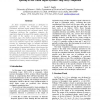Free Online Productivity Tools
i2Speak
i2Symbol
i2OCR
iTex2Img
iWeb2Print
iWeb2Shot
i2Type
iPdf2Split
iPdf2Merge
i2Bopomofo
i2Arabic
i2Style
i2Image
i2PDF
iLatex2Rtf
Sci2ools
102
click to vote
ISVLSI
2002
IEEE
2002
IEEE
Speedup of Self-Timed Digital Systems Using Early Completion
An Early Completion technique is developed to significantly increase the throughput of NULL Convention self-timed digital systems without impacting latency or compromising their self-timed nature. Early Completion performs the completion detection for registration stagei at the input of the register, instead of at the output of the register, as in standard NULL Convention Logic. This method requires that the singlerail completion signal from registration stagei+1, Koi+1, be used as an additional input to the completion detection circuitry for registration stagei, to maintain self-timed operation. However, Early Completion does necessitate an assumption of equipotential regions, introducing a few easily satisfiable timing assumptions, thus making the design potentially more delay-sensitive. To illustrate the technique, Early Completion is applied to a case study of the optimally pipelined 4-bit by 4-bit unsigned multiplier utilizing full-word completion, presented in [1], where a
Related Content
| Added | 15 Jul 2010 |
| Updated | 15 Jul 2010 |
| Type | Conference |
| Year | 2002 |
| Where | ISVLSI |
| Authors | Scott C. Smith |
Comments (0)

